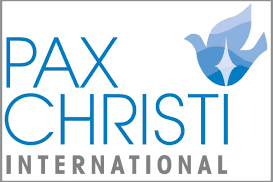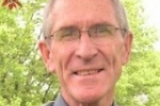Bishop Kevin Dowling: How do I tell the poor that God loves them?

A standing ovation followed The Tablet’s annual lecture last Thursday, delivered by Bishop Kevin Dowling of South Africa’s Rustenburg Diocese to a packed audience in Westminster Cathedral Hall. He had been introduced by The Tablet editor Catherine Pepinster as "exactly the kind of pastor Pope Francis wants us to have" and his call for the Church to be evangelised by the poor and vulnerable echoed the plea of Pope Francis in Evangelii Gaudium for the Church to be concerned with social justice and structural transformations. "How do I tell the poor that God loves them?" he reflected.
Bishop Kevin’s commitment to marginalised people in his own diocese and to peace in violence-torn countries as co-president of Pax Christi International clearly engaged and inspired an enthusiastic audience.
In his lecture, 'From South to North: lessons for the Church from the developing world', Bishop Kevin talked about his conversion experiences as a young Redemptorist priest in apartheid South Africa. Being a first cousin once removed of Archbishop Denis Hurley - the Catholic equivalent of Desmond Tutu, who became a courageous opponent of South Africa’s apartheid regime and a champion of the reforms and spirit of Vatican II – he was thrust into the centre of the anti-apartheid struggle himself. He talked of the South African Church focusing on contextual theology – "doing theology at the coal face" – listening to victims of systemic violence and reflecting on the structural causes of poverty, war and violence. That "led to denunciation of systemic injustice", he said, and to eventual involvement in the prophetic Kairos Document of 1985, a theological statement on the vicious policies of South Africa's Apartheid state.
In the early 1970s Bishop Kevin was influenced by the work of the Latin American theologian Gustavo Gutiérrez and his articulation of liberation theology. Also, the 1971 Synod of Bishops document Justice in the World, which stated that justice is central to the Catholic Church's mission and that "Christian love of neighbour and justice cannot be separated". The response of Catholics to suffering should not simply be charity but action for justice and peace. "Aid is commendable, but we are mainly about building a globalisation of solidarity, as opposed to a globalisation of indifference" Bishop Kevin said; "we must seek the causes of suffering".
Archbishop Oscar Romero was a huge influence and Bishop Kevin quoted a Romero passage from 1980 in which he said, just months before his assassination: "The Church's good name is not a matter of being on good terms with the powerful. The church's good name is a matter of knowing that the poor regard the Church as their own, of knowing that the Church's life on Earth is to call on all, on the rich as well, to be converted and to be saved alongside the poor, for they are the only ones called blessed."
As Co-President of Pax Christi International, Bishop Kevin has witnessed Christian peacemaking initiatives throughout the world. He applauded the 2009 Kairos Palestine document which provides "a way to peace through justice in the context of suffering". He was present in Sarajevo, Bosnia, on 8 June when the Jesuit Refugee Service (JRS) in Syria was awarded the 2014 Pax Christi International Peace Award. JRS Syria now provides support to over 300,000 people in Syria affected by war, and builds bridges between religious communities by ensuring that interfaith work is a priority. Bishop Kevin affirmed JRS Syria in its initiatives to promote the rejection of the logic of war, of the perversion of religions to turn people against one another and the spread of fear of the 'other'.
During questions a relaxed and smiling Bishop Kevin suggested that Northern Churches could learn about Hope from the Southern Churches. He had, for example, been inspired by the women who assisted dying Aids patients in Rustenburg who told him that "God had called us to this". Concern for the environment was also an important issue in the South and supportive advocacy in northern Churches would be welcome, particularly over large-scale mining.
"Environmental concern should be central in the Church’s mission of evangelisation," he said. He also urged the Church to take up the challenge to live more simply and sustainably, and this would be completely in line with the insights of Pope Francis.
Bishop Kevin is a patron of the Denis Hurley Centre in Durban and his talk was one of three in Britain – the other two being at St Chad's Cathedral in Birmingham and the Lauriston Jesuit Centre in Edinburgh - where collections for the project were taken. The Centre presently under construction will be home to about a dozen projects to provide medical care, a soup kitchen, job training, support for people living with HIV/AIDS and in particular will offer assistance to refugees and migrants, who have reached South Africa from as far afield as Somalia, Zimbabwe and the Democratic Republic of Congo.
For more information see: www.denishurleyassociation.org.uk
Photo credit: Sophie Stanes


















